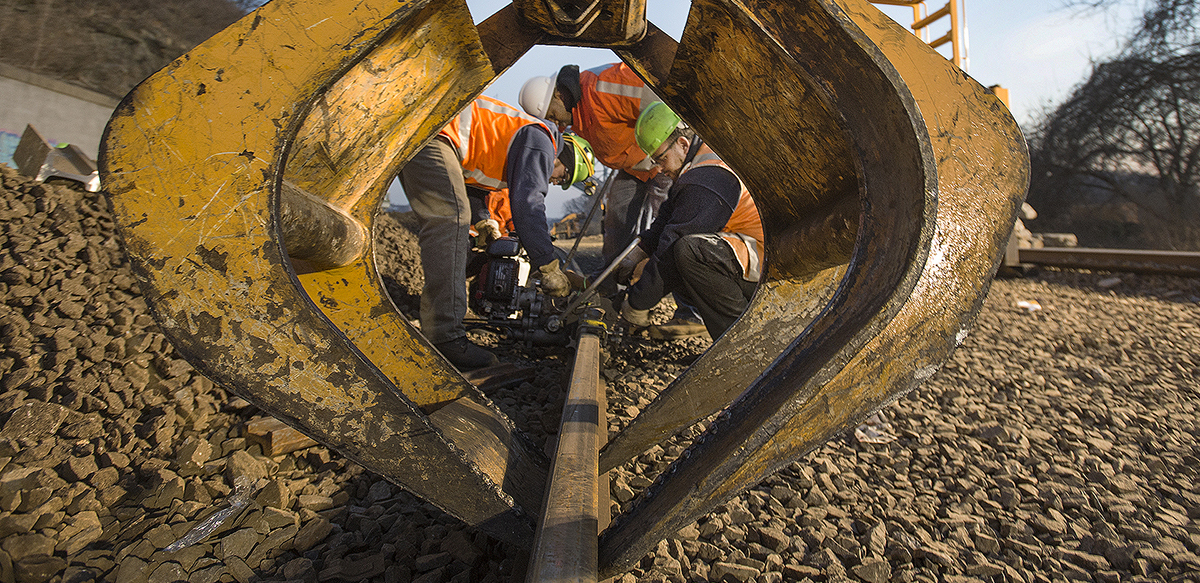Rail Workers Push for One Member, One Vote

Maintenance of way crews repair a damaged section of track on the Metro North. The BMWED is one of the largest of the 13 rail unions. Photo: Metropolitan Transportation Authority (CC BY 2.0 DEED)
Railroad track workers have launched a campaign to get their union officers elected by the members, rather than by convention delegates.
The Brotherhood of Maintenance of Way Employes is one of the largest of the 13 rail unions, with 31,000 members. The campaign is being organized by the group BMWED Rank and File United, with the backing of the longtime reform caucus Teamsters for a Democratic Union (TDU).
“We don’t think a handful of delegates can fully express how the membership is feeling—which is why we vote on contracts!” said Deven Mantz, a 13-year BMWED member at BNSF railroad.
The reformers argue that direct elections aren’t just about fairness in the abstract—they can also engage members and help make the union stronger.
“We’ll win better contracts with more people involved,” says Matt Mortensen, a 19-year BMWED member who maintains buildings and bridges for BNSF. (Mortensen is also a member of TDU’s Steering Committee.) “Right now the railroads aren’t scared of us at all because they know people aren’t involved.”
Moving to “one member, one vote” has played a significant role in reform efforts in the Teamsters and the United Auto Workers.
“Look at what happened in the UAW, with direct elections and electing Shawn Fain,” Mortensen said. “The big automakers are scared of the UAW now, when they weren’t before.”
UNION WITHIN A UNION
The fight is twofold. Organizers are fighting for direct elections at the national union level, but also at the intermediate bodies that sit between local lodges and the national leadership.
Though the Teamsters have had one member, one vote elections for international officers since 1991, that right does not extend to national affiliates. The BMWED affiliated with the Teamsters in 2004, maintaining its delegated structure and functioning as a union-within-a-union.
It has its own national and regional officers who are elected at union conventions. So while members can vote for their local officers and for the international president of the Teamsters, they don’t get a direct vote on anyone in between.
The Teamsters’ other rail affiliate, the Brotherhood of Locomotive Engineers and Trainmen, has had direct elections for officers since 2006, when reformers changed the union bylaws in an all-member referendum. In 2022, BLET members used that mechanism to oust a longtime president over widespread dissatisfaction with a recently settled contract.
WINED AND DINED

SUPPORT LABOR NOTES
BECOME A MONTHLY DONOR
Give $10 a month or more and get our "Fight the Boss, Build the Union" T-shirt.
Many local lodges of the BMWED are small, and much of the day-to-day work of contract enforcement is done by the officers and staff of higher-level bodies—a complex mix of “systems” or “federations” based on where someone works and which company they work for.
System officers are elected by convention delegates, and then appoint staff. In some systems, delegate votes are unweighted. “In my system, we have 32 locals, and each local gets one vote,” Mortensen said. “So there are 4,000 members—and only 32 votes.”
“All they have to do right now is make a few delegates happy and then they stay in office,” said Mantz..
National BMWED officers are elected by convention delegates whose votes are weighted based on how many members they represent. “The people in the bigger lodges get wined and dined, while the smaller lodges get ignored,” Mortensen said.
At the convention, delegates’ name badges say how many votes they’re carrying. Mortensen described candidates for national office walking around the convention grabbing badges to see who’s worth talking to.
‘EASIER THAN YOU THINK’
Direct-election resolutions have been brought to national conventions in the past, and voted down.
“We’ve been struggling over this issue nationally for the past few national conventions,” Mortensen said. “We think the path to victory is through the systems first: winning direct elections system by system.” Three of the systems have their conventions this year.
“You need to show people why they need the change,” said Mantz. “If you can show them at their system why it’s important, then they’ll support it at the national level.”
Some of those fights will be easier than others. At the last national convention, 100 percent of the delegates from Mantz’s BurNor system voted for direct elections. But the reform was voted down by two-thirds of the delegates overall. The next national convention is in 2025.
In the meantime, organizers say the response from their fellow BMWED members has been positive. “When you do get to talk to people, rank-and-file members, everyone gets it,” Mantz said. “They wonder why we haven’t been doing this all along.”
His advice to others? “It’s a lot easier to do this than you might think. Don’t be afraid to step up and make that first phone call, because it’s probably going to go a lot better than you think.”






